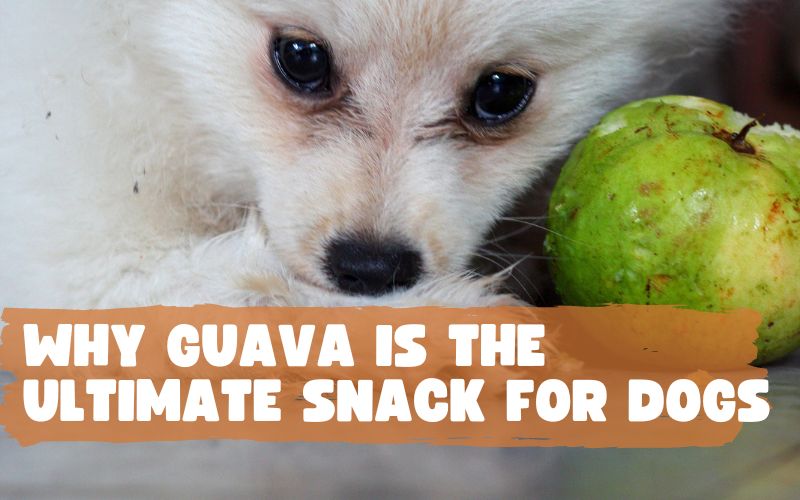“Is your furry friend eyeing that ripe guava on the counter? You’re right to wonder if a nibble of this tropical fruit is safe for dogs.
Your lovely dogs can eat guava, but specific information, you must know before feeding them guava in safety way for their health and well-being.
Our article delves deep into the potential risks and benefits of feeding dogs guava, providing all the information needed to keep your pup healthy and happy.
Ready to learn more?”.
Can Dogs Eat Guava?
Guava, a nutritious tropical fruit packed with beneficial vitamins and minerals, is safe for dogs. The delicate pink or red guava flesh carries abundant health benefits for your pup due to its high fiber content and the presence of vitamins A and K.
These essential nutrients support your dog’s metabolism and contribute significantly to eye health, bone strength, and overall well-being.
However, moderation is key when adding guava to your dog’s diet. Offering small portions of diced ripe guava a few times a week can provide a healthy boost without overloading them on natural sugars present in the fruit.
Dogs eat guava just like they would any other occasional treat – sparingly. Before you feed your dog this delectable fruit, though, there are certain safety measures you need to keep in mind.
Guava seeds must be removed before feeding because they could pose choking hazards or cause gastrointestinal discomfort.
Similarly, the skin should be peeled off as some dogs may find it hard to digest, while leaves should be avoided entirely unless explicitly approved by a veterinarian.
Potential Risks of Feeding Guava to Dogs
Guava, despite its nutritional benefits for dogs when consumed in moderation, can pose potential risks if not properly prepared or given in excess.
High sugar content in guava can spike blood sugar levels, especially in diabetic dogs and those with kidney disease. Overeating this tropical fruit may lead to severe stomach issues such as diarrhea and vomiting due to the dog’s body struggling to digest large amounts of the fruit.
A significant risk of giving your pup guava is the choking hazard of guava seeds. Always remove the seeds before feeding them this tropical treat, particularly for puppies more susceptible to choking hazards.
The flesh of guava, too, can upset a dog’s stomach resulting in diarrhea or even vomiting if consumed excessively.
Feeding should be done sparingly and not daily; overconsumption could lead to gastrointestinal discomfort or other health complications.
Furthermore, avoid giving your pet the skin and leaves of the guava – they are not recommended for canine consumption.
Benefits of Feeding Guava to Dogs
Feeding your dog a small amount of guava can have multiple health benefits. This tropical fruit is brimming with vital nutrients like vitamins A, B6, C, and E and essential minerals such as potassium, calcium, and magnesium.
These nutrients can bolster overall well-being in dogs and contribute to stronger bone health.
A splurge of fiber also comes from guavas which aids the digestive system while keeping your pup full for extended periods. The high vitamin C content boosts their immune systems helping them resist diseases better.
Furthermore, Vitamin K helps maintain heart health in dogs while aiding blood clotting functions.
However tempting it might be to feed more guava to your dog with all these benefits packed in this vibrant fruit – moderation must always be maintained.
Too much sugar from excess consumption could lead to potential risks for your canine pal, including upset stomachs or diarrhea.
As always, when introducing new food into your dog’s diet – start slowly and monitor closely for any changes or adverse reactions.
How to Safely Feed Guava to Your Dog
Feeding guava to your dog can be a healthy and nutritious treat if you follow simple guidelines.
First, removing the rind and seeds before giving guava to your furry friend is essential. The rind can be tough for dogs to digest, and the seeds may pose a choking hazard.
Next, give guava in small amounts to avoid any potential digestive issues. While guava is rich in fiber, too much of it at once can cause diarrhea or an upset stomach in dogs. Moderation is always vital when it comes to feeding guava to your dog.
Additionally, it’s best to give fresh ripe guava rather than processed forms like guava paste or juice. Fresh fruit retains its natural nutrients without added sugars or artificial ingredients that may not benefit your dog.
Overall, safely feeding guava to your dog involves removing the rind and seeds, offering small amounts in moderation, and opting for fresh ripe fruit whenever possible.
By adhering to these guidelines, you can offer a delicious and nourishing snack that will promote the health and overall well-being of your beloved pet.
Conclusion
Dogs can safely eat guava as part of a balanced diet. It is a non-toxic fruit that contains valuable vitamins and minerals beneficial for their overall health.
However, it should be given in moderation, and the seeds should be removed to prevent choking hazards.
Always consult your veterinarian before introducing new food into your dog’s diet.
